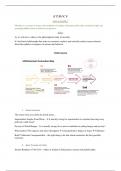Summary
Summary Ethics - Utilitarianism
- Course
- Institution
The following content provides the following: -Definition of Morality -Utilitarianism: 1. Moral intuitions 2. Basic Principle of Utility Central principles: Equality & Impartiality -From Hedonism to Act Utilitarianism: 1. Act Utilitarianism (trolley problems & critiques) -Utilitaria...
[Show more]



